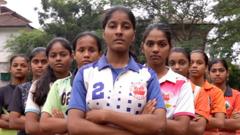This article explores how a dedicated kabaddi club in Kudoshi, India, is providing young girls with a path to empowerment, dreams, and independence, breaking traditional norms that often inhibit their potential.
Transformative Power of Kabaddi: Empowering Girls in India

Transformative Power of Kabaddi: Empowering Girls in India
A kabaddi club in rural India is reshaping girls' lives and aspirations through sports.
In the small rural village of Kudoshi, located around 230km from Mumbai, the transformative sport of kabaddi offers young girls, like 14-year-old Meena, a chance to break free from the constraints of a traditional lifestyle centered around household chores and marriage. Kabaddi, a popular Indian contact sport now played globally, allows players to tag opponents and escape without being taken down. For Meena, it is a moment to embrace power and agency, contrasting sharply with her restricted existence at home. "In that moment, I am not the Meena who is bound to housework... It feels like I am more powerful than other girls who don't play," she expresses, highlighting the sport's significance beyond mere physical engagement.
Fifteen years prior, a passionate group of teachers saw the potential for change in their community and established the region's first all-girls kabaddi club with the belief that girls could pursue sports and even build careers in it. Daji Rajguru, a key figure in this initiative, recalls the challenges of gaining parental support amid traditional gender expectations: "Parents were not ready to let their girls play Kabaddi... worried about the impact on their daughter's marriage prospects." Through persistent reassurance and support, the club evolved to include around 30 dedicated girls, despite initial reluctance from families.
Training diligently for four hours daily, Meena's determination shines through, even in the face of her family's ambivalence toward her sporting ambitions. However, she draws inspiration from club alumni who have succeeded in pursuing professional kabaddi careers, like Siddhi Chalke and Samreen Burandkar, who have not only become financially independent but also served as role models for younger players. Their victories illustrate the potential of sports to change lives—the perception once held by their families has morphed from skepticism to pride in their accomplishments.
Kabaddi has not only offered a route to financial independence, but it has also instilled confidence in the girls who participate. "When we started the sports club, no-one gave any importance to these girls. They were always secondary citizens," comments coach Vilas Bendre. The positive shifts in attitudes within the community are evident as girls eagerly participate in activities previously deemed inappropriate for them, changing their narratives of social acceptance and identity.
While funding for the club comes from the coaches, prize winnings, and occasional donations, participants face no financial barriers. The commitment extends beyond training to ensure the players receive proper nutrition and support during injuries.
Despite ongoing scrutiny regarding coaching priorities, particularly towards gender-specific training, the club’s mission is clear: empower girls to seize opportunities that would generally remain elusive. With dreams of leading India’s kabaddi team, Meena embodies the aspirations and transformation that sports can catalyze.
In a parallel narrative, the Indian Sportswoman Of The Year (ISWOTY) Award recognizes the achievements of female athletes, highlighting the growing visibility and respect for women in sports across India, further propelling the movement towards gender equity in sports and life.
Fifteen years prior, a passionate group of teachers saw the potential for change in their community and established the region's first all-girls kabaddi club with the belief that girls could pursue sports and even build careers in it. Daji Rajguru, a key figure in this initiative, recalls the challenges of gaining parental support amid traditional gender expectations: "Parents were not ready to let their girls play Kabaddi... worried about the impact on their daughter's marriage prospects." Through persistent reassurance and support, the club evolved to include around 30 dedicated girls, despite initial reluctance from families.
Training diligently for four hours daily, Meena's determination shines through, even in the face of her family's ambivalence toward her sporting ambitions. However, she draws inspiration from club alumni who have succeeded in pursuing professional kabaddi careers, like Siddhi Chalke and Samreen Burandkar, who have not only become financially independent but also served as role models for younger players. Their victories illustrate the potential of sports to change lives—the perception once held by their families has morphed from skepticism to pride in their accomplishments.
Kabaddi has not only offered a route to financial independence, but it has also instilled confidence in the girls who participate. "When we started the sports club, no-one gave any importance to these girls. They were always secondary citizens," comments coach Vilas Bendre. The positive shifts in attitudes within the community are evident as girls eagerly participate in activities previously deemed inappropriate for them, changing their narratives of social acceptance and identity.
While funding for the club comes from the coaches, prize winnings, and occasional donations, participants face no financial barriers. The commitment extends beyond training to ensure the players receive proper nutrition and support during injuries.
Despite ongoing scrutiny regarding coaching priorities, particularly towards gender-specific training, the club’s mission is clear: empower girls to seize opportunities that would generally remain elusive. With dreams of leading India’s kabaddi team, Meena embodies the aspirations and transformation that sports can catalyze.
In a parallel narrative, the Indian Sportswoman Of The Year (ISWOTY) Award recognizes the achievements of female athletes, highlighting the growing visibility and respect for women in sports across India, further propelling the movement towards gender equity in sports and life.






















